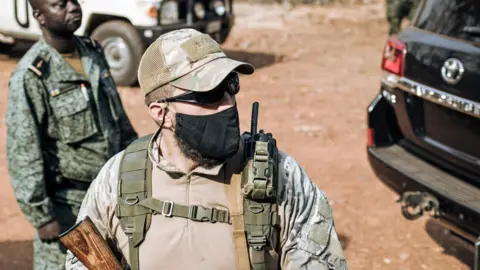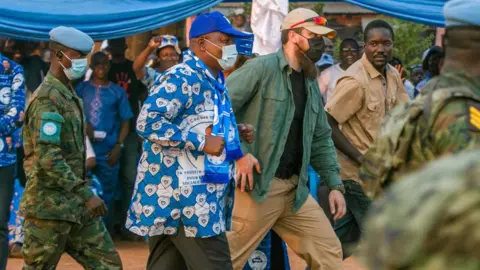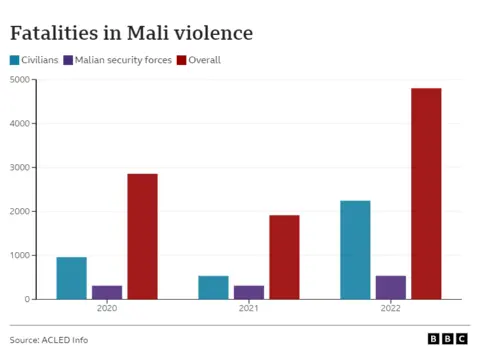Wagner's network in Africa faces uncertain future
 AFP
AFPThe failed weekend mutiny in Russia by the Wagner mercenary group is likely to have repercussions for Africa, where it has several thousand fighters based as well as lucrative business interests.
It is unclear whether Wagner's leader Yevgeny Prigozhin, who has been told to relocate to Belarus, will still run his private army from there to allow it to service its security contracts in places like the Central African Republic (CAR) and Mali.
On Monday, Russian Foreign Minister Sergei Lavrov assured CAR and Mali of the status quo in terms of their crucial security arrangements.
Why is Wagner in Africa?
Primarily to make money - though as it had tacit approval from the Kremlin, it also bolstered Russia's diplomatic and economic interests.
It was a major boon for Russia, for example, when France withdrew its forces from Mali after Wagner agreed in 2021 to help the new military junta in its battle against Islamist militants.
Wagner has just posted a timeline of its operational history on Telegram, confirming its official involvement in Africa began in 2018 when it sent "military instructors" to the CAR and Sudan - and then moving into Libya the following year.
It has been noted that these countries have natural resources of interest to Prigozhin's outfit.
The CAR, which has been unstable for decades, is rich in diamonds, gold, oil and uranium.
Wagner has allowed President Faustin-Archange Touadéra, who even has the mercenaries as his bodyguards, to shrug off the influence of former colonial power France as the country tries to gain the upper hand against rebel groups - in return for a slice of the resource pie.
 Getty Images
Getty Images"Wagner's operational strategy over the past two to three years has been to expand both its military and economic footprint in Africa," Julia Stanyard, from the Global Initiative against Transnational Organized Crime, told the BBC.
The think tank analyst says Wagner has a network of companies associated with it - and they have pursued commercial activities in the countries in which the mercenary group operates.
In CAR these allegedly trade in conflict minerals and timber, as well as making beer and vodka.
Wagner's brief foray into Sudan allowed Russian mining firm M Invest, which the US Treasury alleges is owned or controlled by Prigozhin, to set up operations there. Its subsidiary, Meroe Gold, is one of Africa's biggest gold producers.
In Libya, Wagner is not thought to have the numbers of fighters in the country as it did when it backed renegade general Khalifa Haftar's attempt to take the capital, Tripoli, nearly four years ago.
But strategically, Libya creates a gateway for Russia into Africa, strengthens its presence in the Mediterranean and aligns with the Kremlin's backing of Gen Haftar. Wagner mercenaries still remain around key oil facilities in Haftar strongholds in the east and south of the country - and sources have told the BBC there has not been a noticeable change on the ground since Saturday.
Wagner's interest in Mali may be linked to its rich gold reserves - though there is no evidence as yet of its firms operating there - and it is likely to be more strategic, opening up Russia's sphere of influence in West African countries under pressure from so-called Islamic State and al-Qaeda groups.
Mali could also, according to the large batch of US military documents leaked earlier this year, have been used as a proxy to acquire weapons from Turkey on Wagner's behalf, with one Pentagon dispatch saying junta leader Col Assimi Goïta had confirmed it would do so.
What has Wagner's impact been on the ground?
Wagner fighters have been accused of widespread human rights abuses in several countries.
In 2021, a BBC investigation found evidence that implicated members of the group in Libya in the execution of civilians and the unlawful use of anti-personnel mines and booby traps in family homes around Tripoli.
In Mali, figures from the Armed Conflict Location and Event Data Project (Acled) show that militant violence more than doubled between 2021 and 2022, with civilians making up the highest number of casualties.


Operations by the army involving the Wagner group have led to higher civilian deaths. Among the worst incidents was the killing of some 500 civilians in a week-long operation in the central town of Moura. The UN linked "foreign forces" and the Malian army to the killings, while the US sanctioned two soldiers and the de facto commander of Wagner in Mali.
Earlier this year, the US Treasury accused the mercenaries of engaging in an ongoing pattern of serious criminal activity, including "mass executions, rape, child abductions, and physical abuse in the Central African Republic and Mali".
Though Wagner's success against a powerful rebel coalition in the CAR has entrenched public support there.
This fan base has been helped by local troll farms, run by Mr Prigozhin, with the intention of influencing debate in Africa and whipping up anti-Western sentiment.
For example, the Malian junta has just asked the UN peacekeeping force to leave the country - in line with a social media push to get the force replaced by Russian troops.
In May, Mr Prigozhin told the Cameroon-based Afrique Media TV, a station affiliated with him, that Wagner mercenaries were "more effective" than UN peacekeepers in Mali and the CAR.
What is the possible fallout for Africa?
Analysts say while Wagner has been incredibly useful for the Russian state in Africa, especially as it seeks diplomatic support amid the Ukraine conflict - the mercenary group could not be where it is without the Kremlin.
The two are so intertwined, unravelling them on the continent seems a perilous task.
It is clear in Libya, for example, that Wagner units have been relying heavily on support from the Russian defence ministry.
A UN diplomatic source and Wagner watcher has told the BBC that if the group were to be completely disbanded, its units in Africa would no longer be resupplied by the Russian authorities.
Meanwhile all their fighters in Africa are paid by a Prigozhin holding company, Lou Osborn from the All Eyes on Wagner Project, has told the BBC - an interesting point with regard to Mr Lavrov's recent assurances to the CAR and Mali.
The UN source says that if fighters are left unpaid, with no political or military support - they would essentially be out of job and up for hire in countries grappling with dangerous civil wars and insurgencies.
Russia's President Vladimir Putin has said Wagner fighters should join the regular army, go home or head for Belarus - but Ms Stanyard says it is unclear if this will be the case for the Russian soldiers of fortune in Africa.
The analyst suggests there may be "some sort of compromise position whereby Yevgeny Prigozhin, from his current exile in Belarus, will retain control and ultimate responsibility for the Wagner operations in Africa".
There are also big questions about what will become of the murky business operations in Africa linked to Wagner and Prigozhin.
Interestingly the African-based troll farms, which went silent during the mutiny on Saturday, have focused on the Kremlin's line since the Belarus deal was announced.
One called Mr Putin "the master of war" but did not go so far as to discredit his erstwhile ally Prigozhin - perhaps indicating the two may fudge a way forward together on Africa.
